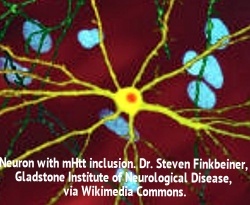 An estimated 30,000 people in the United States are afflicted with Huntington’s disease. Receiving a diagnosis of this genetic neurodegenerative disorder is unimaginably devastating. Sufferers slowly lose control of their movement and develop psychiatric problems over the course of 10-25 years, and often the disease is undetected until adulthood. Just this year, UC Davis researchers in Sacramento, California have discovered that human mesenchymal stem cells (MSCs) – cells with the ability to differentiate into bone cells, muscle cells, and other cell types – could be the key to developing an effective new therapy to treat Huntington’s. The promising findings are published in the journal Molecular Therapy.
An estimated 30,000 people in the United States are afflicted with Huntington’s disease. Receiving a diagnosis of this genetic neurodegenerative disorder is unimaginably devastating. Sufferers slowly lose control of their movement and develop psychiatric problems over the course of 10-25 years, and often the disease is undetected until adulthood. Just this year, UC Davis researchers in Sacramento, California have discovered that human mesenchymal stem cells (MSCs) – cells with the ability to differentiate into bone cells, muscle cells, and other cell types – could be the key to developing an effective new therapy to treat Huntington’s. The promising findings are published in the journal Molecular Therapy.
The mechanism of Huntington’s disease is an abnormality in the huntingtin gene, which causes an overabundance in the brain of a mutated protein, mHtt. A high concentration of this protein interferes with the expression and transport of a key brain growth factor, BDNF, resulting in the death of cells in a particular area of the brain. Earlier methods of replacing BDNFNeuron with mHTT inclusion have not proven to be effective, or result in other problems throughout the body. Recently the Davis research team, led by principal investigator Vicki Wheelock, has developed a new and much more feasible approach.
“For the first time, human stem cells have been successfully used as a platform to deliver brain-derived neurotrophic factor (BDNF), the growth factor that shows great promise for treating Huntington’s disease,” said Wheelok, clinical professor of neurology and director of UC Davis’s Huntington’s Disease Center of Excellence Clinic.
The advantage of using MSCs to deliver BDNF is that they are not rejected by the immune system (even if they are donor cells), they are drawn to regions of injury, and they promote cell growth and neuron interactions. “MSCs act as ‘paramedic delivery trucks’ that move through damaged brain tissue, delivering factors that promote healing and new growth,” explained Jan Nolta, co-principal investigator and director of the UC Davis Stem Cell Program and its Institute for Regenerative Cures in Sacramento. “They are an excellent platform for delivering growth factors or other therapeutic agents.”
